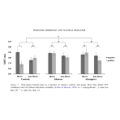Abstract
Objective. Based on the ideation-to-action framework of suicidality, this study aimed to examine whether suicide attempters differ from suicide ideators or nonsuicidal controls in response inhibition under emotional context. Method. A total of 142 community adults with lifetime history of suicide ideation or attempt as well as nonsuicidal controls were recruited. All participants completed an emotional stop-signal task and self-report measures of impulsivity. Results. In the stop-signal task, suicide attempters did not differ from ideators in response inhibition under emotional context. Moreover, both attempters and ideators did not differ from nonsuicidal controls in response inhibition to negative emotions. Compared with nonsuicidal controls, suicide ideators and attempters exhibited poorer response inhibition to positive emotions in the threat context but not in the nonthreat context. Using self-report measures, it was found that only negative urgency differentiated suicide attempters from ideators or nonsuicidal controls. Conclusions. These results suggest that people who have thought about or attempted suicide have impaired response inhibition toward positive emotional stimuli in threat contexts but not toward negative emotional stimuli. However, suicide attempters perceived themselves as more impulsive when experiencing negative emotional states as compared with suicide ideators and nonsuicidal controls.
